by Deep Green Resistance News Service | Oct 4, 2017 | Property & Material Destruction
by Max Wilbert / Deep Green Resistance
Have you heard the incredible news about Jessica Reznicek and Ruby Montoya, two activists who sabotaged the Dakota Access Pipeline? In early August, the two women admitted to committing multiple acts of eco-sabotage against the Dakota Access Pipeline (DAPL). They made their statement on video in front of the Iowa Utilities Board, talking about what they had done, reading their press release, and then started to tear down the sign of the Utilities Board.
The two women were arrested for that action, then released on bail. Their home has since been raided by the FBI and materials have been confiscated in an ongoing investigation. I highly recommend you read their press release. It’s fascinating.
These two are likely to be charged with serious crimes, and we urge you to follow their case for ways that you can support them.
One of the things that’s most important about their press release is in reference to a specific act of sabotage the two women carried in May 2017. This action was hidden from the public. At the time of the event, Energy Transfer Partners described it as an accident. They covered up the fact that the delay was due to sabotage.
There are certain situations in which it’s in a corporation’s or government’s best interest to disclose that there has been sabotage to drum up public opposition and outrage, invoke terrorism or whatever the latest political specter is in order to make people afraid, boost budgets, and allow the further curtailment of civil liberties.
However, there are other situations in which it’s in their best interest to hide what is going on—to not tell people about these attacks. Obviously, this was one of those circumstances. The thought process of managers at Energy Transfer Partners must have been something like this: “We don’t want people doing copycat actions, we don’t want people understanding that these tactics can be effective, that sabotage can be effective at stopping this pipeline.”
Two people alone made a huge difference using these tactics. They delayed the pipeline for months. That’s something that tens of thousands of people involved in the public Standing Rock protests were barely able to match. While nobody was ultimately able to stop the pipeline, the fact that two women with no training and almost no money were able to seriously damage and delay the pipeline is a testament to how effective sabotage can be.
The reason Jessica and Ruby came forward is that they wanted the truth to be known. To me, that’s very important. It’s inspiring. It points to the fact that there are likely many more of these actions happening than we know about. It’s not in the corporations’ best interest to tell us, because these stories of resistance are inspiring and they know that. This is a dangerous thing, and they know that.
See Max Wilbert’s video here. DGR interviewed Jessica Reznicek and Ruby Montoya about their actions. Read their interview here.
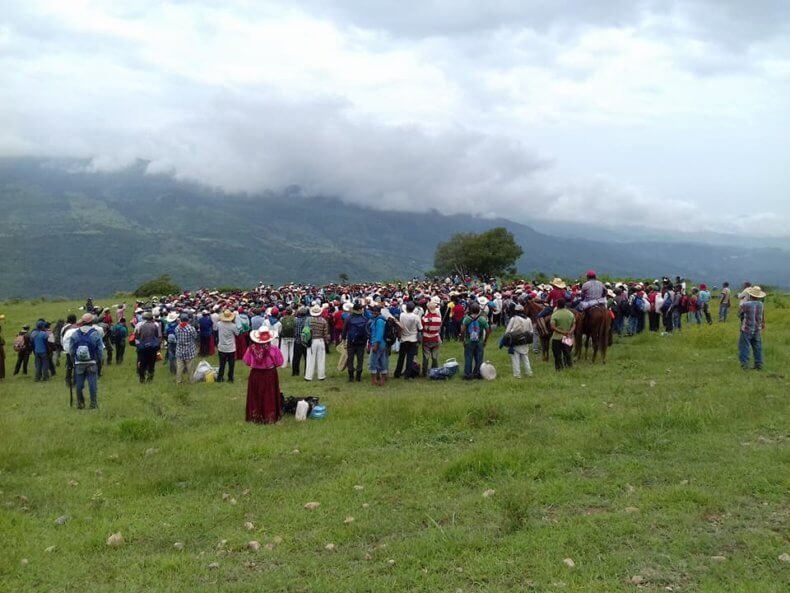
by Deep Green Resistance News Service | Sep 26, 2017 | Reclamation & Expropriation
Featured image by Octaviano Díaz Chema
by Tracy Barnett / Intercontinental Cry
HUAJIMIC, Nayarit, Mexico — A century-old land conflict has flared up again in the Western Sierra Madre, deepening already raw tensions in the wake of the May 2017 assassination of two Huichol (Wixárika) leaders who fought to reclaim that land.
On Friday, the anniversary of last year’s equally contentious reclamation action, 1,200 indigenous Huichols hiked for three hours down a mountain into the contested valley of Huajimic to meet the court officials scheduled to sign over to them a bitterly contested piece of farmland.
The officials never arrived, however, because ranchers opposing the restitution staged a roadblock, and police never showed up to enforce the action. Now the Huichols say they’ll stay put on the remote piece of farmland until the restitution is complete, setting the stage for a potentially violent standoff of uncertain duration.

Photo: Octaviano Díaz Chema
Friday’s restitution was to be the second in a series of legal procedures recognizing the wrongful possession of 10,500 hectares (nearly 26,000 acres) of Huichol land by the region’s mestizo ranchers more than 100 years ago.
The ranchers hold titles from the Mexican government dated around 1906, but the Huichol people hold land grants dating back to the 1700s from the Spanish crown.
Since last year’s hard-fought restitution, the leader of that effort, Miguel Vázquez Torres, was shot to death by a truck full of armed gunmen, as was his brother Agustin. Many suspect they were targeted because of their outspoken support of the land restitution.
On Sept. 22, 2016, after a series of lawsuits were decided in favor of the Huichol community of San Sebastián Teponohuaxtlán, they moved in to claim their first parcel, a 184-hectare (454-acre) hillside ranch about 5 miles from the ranching town of Huajimic. That action was followed with a roadblock and threats of violence. Since that time three Huichol families moved in to set up a homestead and begin farming, and faced repeated threats from residents of the nearby town of Huajimic.
This time, the contested tract is only 63.7 hectares (157 acres), but for the Huichol community, it represents the leading edge of their fight to reclaim their ancestral homelands. For the ranchers, it represents the line they must hold to prevent the dispossession of lands that have been in their families for generations.
The day before the scheduled restitution, local and state officials met in the Nayarit state capital of Tepic with Agrarian Tribunal Magistrate Aldo Saúl Muñoz López and assured him that public security forces would be present to prevent violence, said Cristián Chávez, a territorial expert representing the Huichol community of San Sebastian, who was present at the meeting and the subsequent roadblock.
The promised police forces never showed up, and a caravan including various court officials, a state human rights observer, attorneys and media representatives made their way through the hilly terrain, driving for more than an hour before confronting the roadblock. Several pickup trucks blocked the road and about 40 individuals were on the scene, said Chávez.
Magistrate Muñoz López got down from his truck and informed the ranchers that he was there to carry out an order from the court, and politely asked them to let the caravan pass, according to a report by Agustín del Castillo from Milenionewspaper. Ranchers flatly denied passage.
Given that there was no law enforcement present, Muñoz López drew up a document describing the circumstances that prevented the execution of justice, and expressed his intention to seek the means to follow through with the legal decision as soon as possible, said Chávez. He also reassured the ranchers that he would take their concerns to the authorities in the state and federal government.
Carlos González was visibly upset with the circumstances, according to del Castillo’s report. “We blame the governor of Nayarit, Antonio Echavarría, his secretary general of government and his attorney general, for the violence that could be caused by this situation, since 1,200 comuneros have come down to the property and taken possession of it, and given the traffic and food blockades on the part of the ranchers, the situation may become unsustainable,” he said with obvious annoyance.
The Mexican government has come under severe criticism for its lack of action in the case, rejecting repeated requests by Huichol leaders and ranchers alike to reimburse ranchers with federal funds designated to help prevent land conflicts.
The spokesman for Mexico’s Secretariat of Agrarian, Territorial and Urban Development, which is charged with resolving land disputes, said the agency lacks the resources to get involved and is already faced with more than 300 pending land conflicts.
Huichol representatives have taken their case directly to the public in videos posted on Facebook Saturday. They say they will continue to occupy the land until the court officials arrive and formalize the restitution. In one of them, a camera pans a massive crowd standing in a field, with mountains in the backdrop. Felipe Serio Chino, president of the community’s security council, steps forward.
“Today, Sept. 22, 2017, more than 1,000 comuneros (Huichol community members) gathered here in this place to demand of Magistrate Aldo Raul Muñoz López, who is in charge of Tribunal 56 in Tepic, Nayarit, that he deliver this land into our possession as it was programmed. All these comuneros are awaiting your presence. Without it, we will stay until we achieve the objective we came here for.
“We send a salute to Mr. Aldo but we also ask him not to be a coward, to not be afraid, to not allow anyone to prevent him from doing his duty… the law has recognized it; we are only demanding what is ours.”
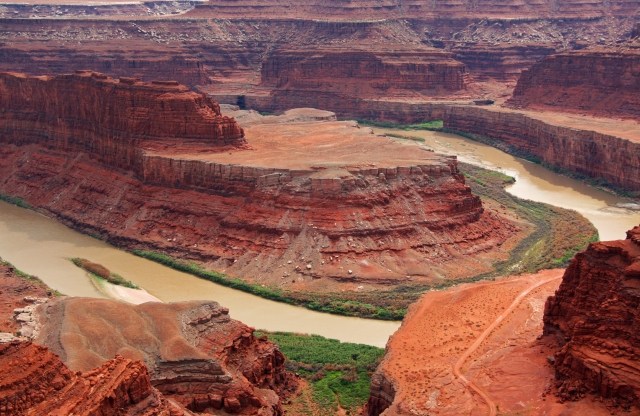
by Deep Green Resistance News Service | Sep 25, 2017 | Lobbying, Strategy & Analysis
Featured image: Dead Horse Point, Colorado River. (Clément Bardot/Wikimedia/CC-BY-SA-3.0)
Editor’s note: The first Rights of Nature lawsuit in the US was filed on September 25, 2017, in Denver, Colorado. The full text of the complaint can be found here.
by Will Falk / Deep Green Resistance
On Tuesday, September 26, the Colorado River will sue the State of Colorado in a first-in-the-nation lawsuit requesting that the United States District Court in Denver recognize the river’s rights of nature. These rights include the rights to exist, flourish, regenerate, and naturally evolve. To enforce these rights, the Colorado River will also request that the court grant the river “personhood” and standing to sue in American courts.
Four of my comrades in the international environmental organization Deep Green Resistance and I, are serving as “next friends” to the Colorado River. We are represented by the noted civil rights attorney Jason Flores-Williams who is based in Denver. Community Environmental Legal Defense Fund is serving as advisors in the case.
The term “as next friends” is a legal concept that means we have signed on to the lawsuit as fiduciaries or guardians of the river. Under current law, the Colorado River is not “legally competent” and, so needs “next friends” to ensure her rights are protected. A “next friend” is someone who appears in court in place of another who is not competent to do so – like a minor or someone with a mental disability. My role, as next friend to the Colorado River, is to protect the river’s rights.
We recently released a press release that has been widely shared on social media. National media outlets are beginning to take notice. And, we’re getting interviews, receiving email inquiries, and responding to online comments. So far, the most common question is: Why does the Colorado River need rights?
************
The most fearless environmental philosophers – thinkers like Susan Griffin, Neil Evernden, Derrick Jensen, and John Livingston – have insisted that we will never be safe so long as the natural world we depend on is objectified and valued only for the way humans use it. Livingston calls the objectification of nature “resourcism” and explains: “A ‘resource’ is anything that can be put to human use … It is the concept of ‘resource’ that allows us to perceive nature as our subsidiary.” Livingston notes that once the nonhuman “is perceived as having some utility – any utility – and is thus perceived as a ‘resource,’ its depletion is only a matter of time.”
Because our legal system currently defines nature as property, “resourcism” is institutionalized in American law. While climate change worsens, water continues to be polluted, and the collapse of every major ecosystem on the continent intensifies, we must conclude that our system of law fails to protect the natural world and fails to protect the human and nonhuman communities who depend on it.
Jensen, while diagnosing widespread ecocide, observes a fundamental psychological principle: “We act according to the way we experience the world. We experience the world according to how we perceive it. We perceive it the way we have been taught.” Jensen quotes a Canadian lumberman who once said, “When I look at trees I see dollar bills.”
The lumberman’s words represent the dominant culture’s view of the natural world. Jensen explains the psychology of this objectification, “If, when you look at trees you see dollar bills, you will act a certain way. If, when you look at trees, you see trees you will act a different way. If, when you look at this tree right here you see this tree right here, you will act differently still.”
Law shapes our experience of the world. Currently, law teaches that nature is property, an object, or a resource to use. This entrenches a worldview that encourages environmental destruction. In other words, when law teaches us to see the Colorado River as dollar bills, as simple gallons of water, as an abstract percentage to be allocated, it is no wonder that corporations like Nestle can gain the right to run plastic bottling operations that drain anywhere from 250 million to 510 million gallons of Colorado River water per year.
The American legal system can take a good step toward protecting us all – human and nonhuman alike – by granting ecosystems like the Colorado River rights and allowing communities to sue on these ecosystems’ behalf. When standing is recognized on behalf of ecosystems themselves, environmental law will reflect a conception of legal “causation” that is more friendly to the natural world than it is to the corporations destroying the natural world. At a time when the effects of technology are outpacing science’s capacity to research these effects, injured individuals and communities often have difficulty proving that corporate actions are the cause of their injuries. When ecosystems, like the Colorado River, are granted the rights to exist, flourish, regenerate, and naturally evolve, the obsolete causation theory, en vogue, will be corrected.
************
American history is haunted by notorious failures to afford rights to those who always deserved them. Americans will forever shudder, for example, at Chief Justice Roger Taney’s words, when the Supreme Court, in 1857, ruled persons of African descent cannot be, nor were never intended to be, citizens under the Constitution in Dred Scott v. Sanford. Justice Taney wrote of African Americans, “They had for more than a century before been regarded as being of an inferior order, and altogether unfit to associate with the white race … and so far inferior, that they had no rights which the white man was bound to respect…” And, of course, without rights that white, slave-owning men were bound to respect, the horrors of slavery continued.
The most hopeful moments in American history, on the other hand, have occurred when the oppressed have demanded and were granted their rights in American courts. Despite centuries of treating African Americans as less than human while defining them as property, our system of law now gives the same rights to African Americans that American citizens have always enjoyed. Once property, African Americans are now persons under the law. Similarly, despite a centuries-old tradition where women were, in the legal sense, owned by men, our system of law now gives the same rights to women that American citizens have always enjoyed. Once property, women are now a person under the law.
It’s tempting to describe this history as “inevitable progress” or as “the legal system correcting itself” or with some other congratulatory language. But, this glosses over the violent struggles it took for rights to be won. The truth is, and we see this clearly in Justice Taney’s words, the American legal system resisted justice until change was forced upon it. It took four centuries of genocide and the nation’s bloodiest civil war before our system of law recognized the rights of African Americans. While the courts resisted, African Americans were enslaved, exploited, and killed.
Right now, the natural world is struggling violently for its survival. We watch hurricanes, exacerbated by human-induced climate change, rock coastal communities. We choke through wildfires, also exacerbated by human-induced climate change, sweeping across the West. We feel the Colorado River’s thirst as overdraw and drought dries it up. It is the time that American law stop resisting. Our system of law must change to reflect ecological reality.
************
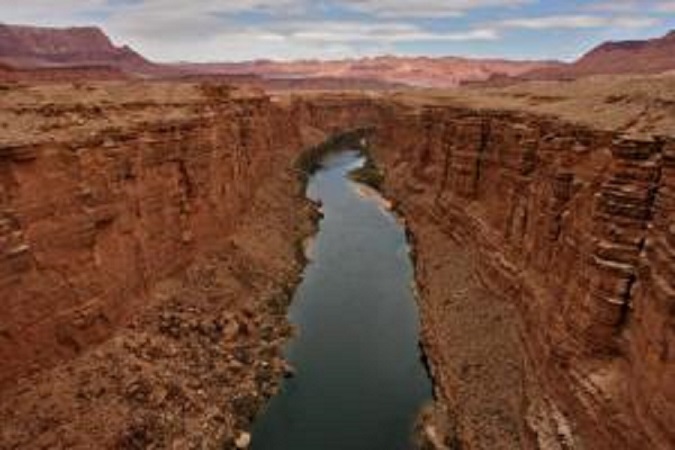
Colorado River between Marble Canyon (Source: Alex Proimos/Flickr/CC-BY-NC-2.0)
This is ecological reality: all life depends on clean water, breathable air, healthy soil, a habitable climate, and complex relationships formed by living creatures in natural communities. Water is life and in the arid American Southwest, no natural community is more responsible for the facilitation of life than the Colorado River. Because so much life depends on her, the needs of the Colorado River are primary. Social morality must emerge from a humble understanding of this reality. Law is integral to any society’s morality, so law must emerge from this understanding, too.
Human language lacks the complexity to adequately describe the Colorado River and any attempt to account for the sheer amount of life she supports will necessarily be arbitrary. Nevertheless, many creatures of feather, fin, and fur rely on the Colorado River. Iconic, and endangered or threatened, birds like the bald eagle, greater sage grouse, Gunnison sage grouse, peregrine falcon, yellow-billed cuckoo, summer tanager, and southwestern willow flycatcher make their homes in the Colorado River watershed. Fourteen endemic fish species swim the river’s currents including four fish that are now endangered: the humpback chub, Colorado pikeminnow, razorback sucker, and bonytail.
Many of the West’s most recognizable mammals depend on the Colorado River for water and to sustain adequate food sources. Gray wolves, grizzly bear, black bear, mountain lions, coyotes, and lynx walk the river’s banks. Elk, mule deer, and bighorn sheep live in her forests. Beavers, river otters, and muskrats live directly in the river’s flow as well as in streams and creeks throughout the Colorado River basin.
The Colorado River provides water for close to 40 million people and irrigates nearly 4 million acres of American and Mexican cropland. Agriculture uses the vast majority of the river’s water. In 2012, 78% of the Colorado’s water was used for agriculture alone. 45% of the water is diverted from the Colorado River basin which spells disaster for basin ecosystems. Major cities that rely on these trans-basin diversions include Denver, Los Angeles, San Diego, and Salt Lake City.
Despite the Colorado River’s importance to life, she is being destroyed. Before the construction of dams and large-scale diversion, the Colorado flowed 1,450 miles into the Pacific Ocean near Sonora, Mexico. The river’s life story is an epic saga of strength, determination, and the will to deliver her waters to the communities who need them. Across those 1,450 miles, she softened mountainsides, carved through red rock, and braved the deserts who sought to exhaust her.
Now, however, the Colorado River suffers under a set of laws, court decrees, and multi-state compacts that are collectively known as the “Law of the River.” The Law of the River allows humans to take more water from the river than actually exists. Granting the river the rights we seek for her would help the courts revise problematic laws.
The regulations set forth in the 1922 Colorado River Compact are the most important and, perhaps, the most problematic. Seven states (Arizona, California, Colorado, New Mexico, Nevada, Utah, and Wyoming) are allotted water under the Compact. When the Compact was enacted, the parties assumed that the river’s flow would remain at a reliable 17 million acre-feet of water per year and divided the water using a 15-million acre feet per year standard. But, hydrologists now know 17 million acre-feet represented an unusually high flow and was a mistake. Records show that the Colorado River’s flow was only 9 million acre-feet in 1902, for example. From 2000-2016, the river’s flow only averaged 12.4 million acre-feet per year. So, for the last 16 years, the Compact states have been legally allowed to use water that isn’t there.
“Use it or lose it” laws are also common throughout the Colorado River basin. These laws threaten ranchers, farmers, and governments holding water rights who use less water than they are legally entitled to with seeing their allotments cut. So, those with water rights are encouraged to trap or use more water than they need.
Since the completion of the Glen Canyon Dam in 1963, the Colorado River has rarely connected with the sea. Stop and let that sink in. Many scientists believe the river is between 4 and 6.5 million years old. The Colorado River is so strong, so determined, she cut out the Grand Canyon. This magnificent being, millions of years old, who formed the Grand Canyon is being strangled to death by dams, climate change, overallocation, and a legal system that refuses to remedy its own insanity.
************
When you contemplate all those who depend on the Colorado River when you know the sheer quantity of life the river sustains, is it possible to mistake her inherent value?
I hate to reduce a being so ancient and so powerful to an argument based in human self-interest. Know this: If you’re one of the 40 million Americans who depend on the Colorado River’s water and you’re hydrated right now, the river is literally part of you. If that water is poisoned, if that water dries up, if corporate rights to steal that water and sell it back to you continue to trump the river’s right to exist, you will be hurt. This is not law. This not rhetoric. This is reality.
This is also why the Colorado River needs rights. Life requires clean water, breathable air, healthy soil and a habitable climate to create healthy ecosystems. Without these ecosystems, life is impossible and the right to life is meaningless. American law fails to protect life’s requirements because it defines nature as property and does not recognize the rights of nature. In a rights-based system of law, to be without rights is to be defenseless. And, after witnessing centuries of the exploitation of the natural world, we know that to be defenseless is to ultimately be destroyed. It’s time we protect those, like the Colorado River, who give us life.
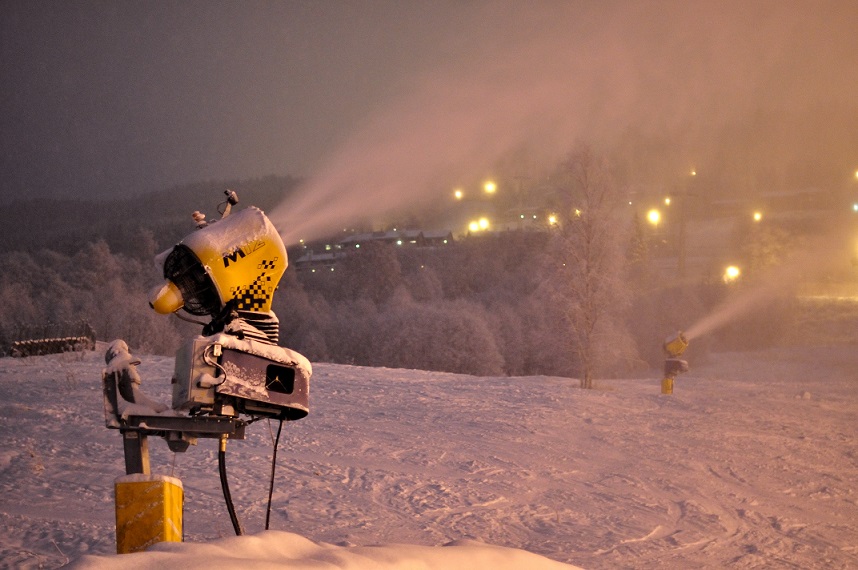
by Deep Green Resistance News Service | Sep 22, 2017 | Strategy & Analysis
Editor’s note: This is the third installment in a multi-part series. Browse the New Park City Witness index to read more.
by Will Falk / Deep Green Resistance
Author’s Note: A member of Park City’s city government recently asked me why I write about Park City when Park City is doing so much for the environment, compared to other communities. I hope my respect for this person and the question is reflected in the days I spent contemplating an answer. In order to answer this question, I must answer several related questions. These answers give me a chance to be transparent about my motivations for writing this New Park City Witness series.
Underlying the question “Why do I write about Park City?” is the question “Why do I write at all?”
One reason I write is reflected in an experience I had, a few days ago, in Summit Land Conservancy’s offices. On a shelf, in a conference room, a book’s plain green and white cover grabbed my attention. It was the first edition of Park City Witness, published in 1998. Having recently finished the second edition of Park City Witness, and learning the first was long out of print, I was excited to see an original copy. I asked Summit Land Conservancy executive director Cheryl Fox if I could borrow the book.
Books, as anyone who has read a few knows, have the power to choose their readers. While reading the preface to the first Park City Witness, I knew I had been chosen. Maybe Cheryl knew I needed to read the book, too, because she wrote the preface to the first Park City Witness. In this preface, she quoted author Stephen Trimble who, in 1997 “speaking to a collection of writers and slow-growth activists amid the crowded shelves of Dolly’s Bookstore…explained how important it is for people who can write to write.”
Twenty years later, and Trimble’s words feel like they were spoken directly to me. I can write and because I can write, it is important for me to write.
If it’s important for people who can write to write, it’s even more important for people who can write to write what needs to be read. While nearly two hundred species go extinct daily, while every mother’s breastmilk contains known carcinogens, while every major biosphere on Earth collapses around us, does anything need to be read more than encouragement for stopping the destruction?
I think the answer is obviously no. Many artists share this feeling. My favorite political cartoonist, Stephanie McMillan, in an essay titled “Artists: Raise Your Weapons” writes “…in times like these, for an artist not to devote her/his talents and energies to creating cultural weapons of resistance is a betrayal of the worst magnitude, a gesture of contempt against life itself. It is unforgivable.”
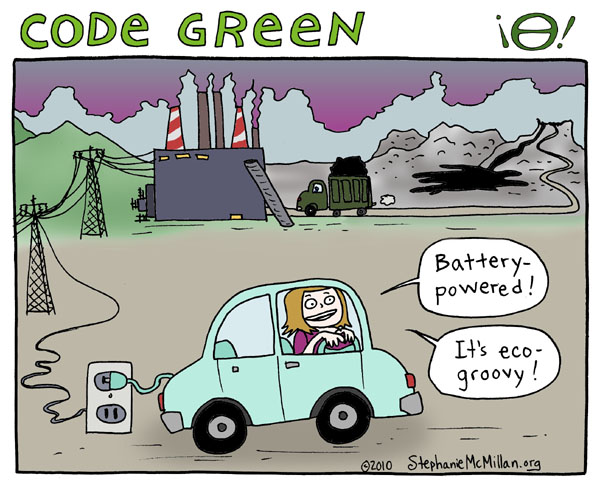
Derrick Jensen, reflecting on a decades-long writing career with over twenty published books, writes, “…if we judge my work, or anyone’s work, by the most important standard of all, and in fact the only standard that really matters, which is the health of the planet, my work (and everyone else’s) is a complete failure. Because my work hasn’t stopped the murder of the planet.”
***
I write about Park City because of the privilege and power that exist here.
It may or may not be true that Park City does more than other communities to protect the environment. We must remember that Park City’s human population depends on an ecologically unnecessary and problematic industry – tourism – for its continued existence. Ask yourself: Do corporate marketers spend millions of dollars on enticing hundreds of thousands of people to board greenhouse gas emitting planes from around the world to visit… Kamas? Are tons of coal burned to pump hundreds of millions of gallons of water up mountainsides to snow-making machines in…Heber?
There’s a sense in which it really doesn’t matter whether Park City is doing more than other communities. My almost-five-year-old niece is becoming notorious for her sassy one-liners and refusing to let adults get away with their bullshit. I shudder when I think about looking her in the eye when she’s my age. She’s not going to care if Park City did more than other communities to stop the destruction of the world. She’s going to care that she can raise children in a world with clean water, clean air, and a habitable climate. She’s going to care, if she does have a baby, that she can feed her baby without passing carcinogens through her breastmilk to her baby.
I write about Park City because it doesn’t matter which community is more environmentally-friendly. The only thing that matters, while life on earth collapses, is stopping the collapse. Stopping the collapse will require confrontation with those in power and this confrontation will require material resources. Close to 80% of Park City’s population is white and white people benefit the most from the exploitation of the natural world. People of color, around the world, have long formed the frontlines of the environmental movement. Justice demands that white people join them there. Similarly, the median property value in Park City is $868,100, and the median household income is $105,000, which is almost double the national average. Park City has more than most communities, so Park City should give more than most communities.
***
The most important reason I write is because I’m in love. I’m in love with Gambel oak, maple, and aspen. I’m in love with the way they offer one last display of visual ecstasy in their changing colors before sleeping for the winter. I’m in love with rain and snow, the mystical moment rain becomes snow on a northerly autumn wind, and the water both of them bring. I’m in love with my partner, who was born here. I’m in love with her big, gorgeous brown eyes. I’m in love with the way her eyes become even bigger with warmth when she hears joy in her loved ones’ voices.
In short, I’m in love with life – a life made possible by Park City’s natural communities. We may experience life because the water we drink here, the air we breathe here, and the food we eat here combine to give us physical bodies. To love life is to love our bodies and loving our bodies, we must listen to them.
My body tells me to write. If I go more than a few days without pen, notebook, and solitude, the physical symptoms of anxiety affect me. I become fidgety, easily distracted, and slightly sick to my stomach. The longer I go without writing something coherent, the worse these symptoms get.
My body speaks through these symptoms. Through fidgetiness, my body tells me to act; writing, after all, is an action. The troubles with concentration are a warning to use my focus or lose it. Nausea accompanies and symbolizes the writing process, for me. There are times I’ve tried to quit writing, tried to shirk the hours of rumination, research, and drafting. But, the best words are not mine. They are given to me. Unreleased, they pool like bile and there is no relief until they’re written.
I used to be embarrassed to admit that I write to feel better. This seemed selfish to me. It felt impure. But, now I know that I do not create the anxiety anymore than I create the swelling that accompanies rolling an ankle. The swelling is a gift, a gift from my body, from the forces of life creating my body. My body, through swelling, tells me not to walk on the rolled ankle, and tells me to let the ankle heal.
Wherever we look there are bodies swelling, wounded, and scarred. Forests are clearcut, rivers no longer flow to the sea, and canyons are flooded by reservoirs. Life speaks through bodies – ours’, forests’, rivers’, canyons’ and so many more. Life tells us to let these bodies heal.
Before healing can take place, the injury must be stopped. Life, everywhere, is being injured. It does not matter how we stop the injury. But, we must stop it. There are a growing number of us in Park City who are willing to do more than is currently being done. We are willing to place our bodies in front of those destroying the planet – bodies we love as much as you love yours. Many of us are young, lack the wealth of older generations, look at a future growing darker and darker, and say, “This must stop.”
We could use your help.
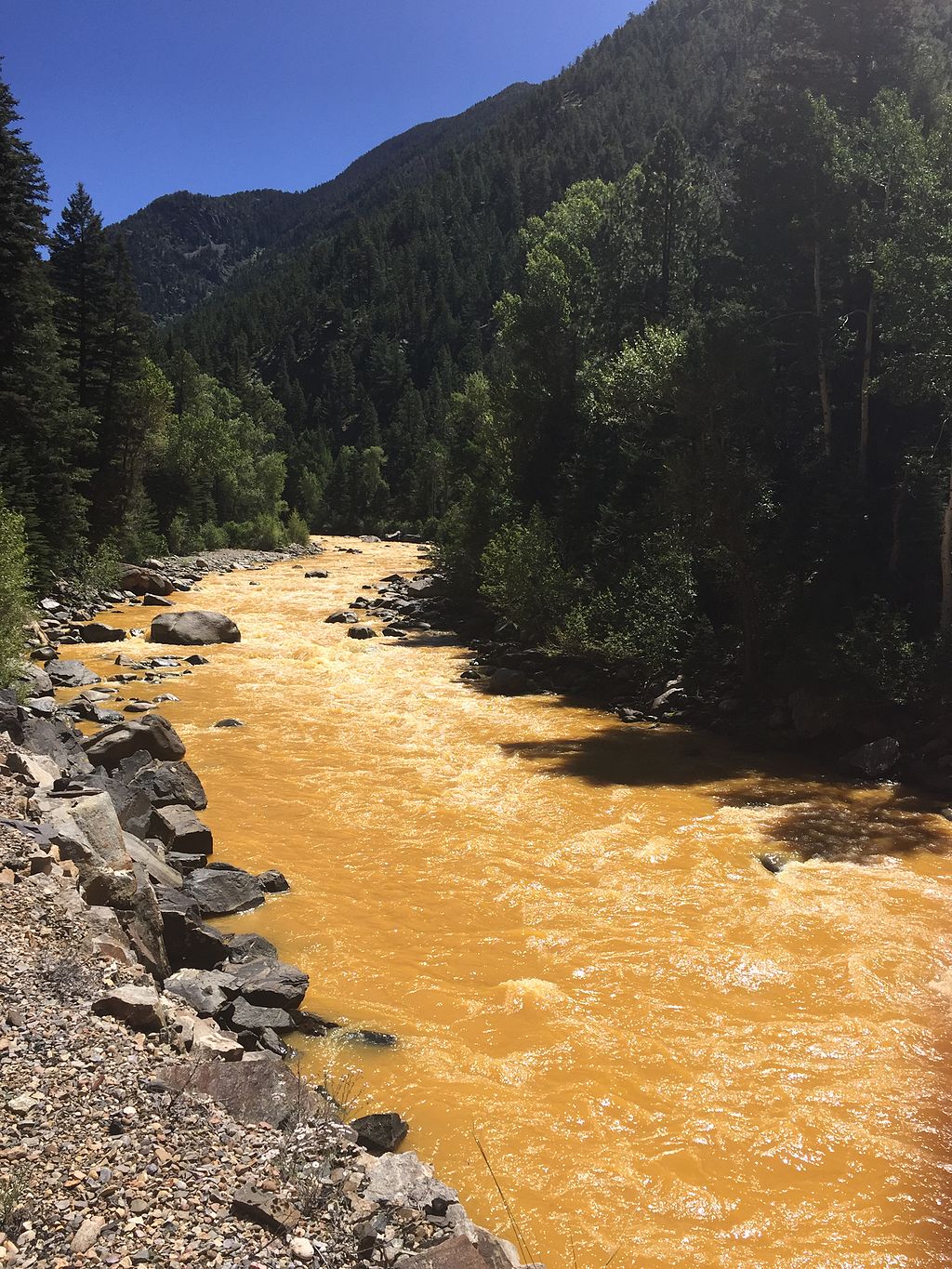
by Deep Green Resistance News Service | Sep 21, 2017 | Lobbying
Featured image: The 2015 Gold King Mine waste water spill in the Animas River, in southwest Colorado. The Animas is a tributary to the Colorado River.
Editor’s note: The first Rights of Nature lawsuit in the US was filed on September 25, 2017, in Denver, Colorado. The full text of the complaint can be found here.
“Contemporary public concern for protecting nature’s ecological equilibrium should lead to the conferral of standing upon environmental objects to sue for their own preservation.” Supreme Court Justice William O. Douglas, Sierra Club v. Morton (1972)
Denver, Colorado–In a first-in-the-nation lawsuit filed in federal court, the Colorado River is asking for judicial recognition of itself as a “person,” with rights of its own to exist and flourish. The lawsuit, filed against the Governor of Colorado, seeks a recognition that the State of Colorado can be held liable for violating those rights held by the River.
The Plaintiff in the lawsuit is the Colorado River itself, with the organization Deep Green Resistance – an international organization committed to protecting the planet through direct action – filing as a “next friend” on behalf of the River. The River and the organization are represented in the lawsuit by Jason Flores Williams, a noted civil rights lawyer and lead attorney in a recent class-action case filed on behalf of Denver’s homeless population.
While this is the first action brought in the United States which seeks such recognition for an ecosystem, such actions and laws are becoming more common in other countries. In 2008, the country of Ecuador adopted the world’s first national constitution which recognized rights for ecosystems and nature; over three dozen U.S. municipalities, including the City of Pittsburgh, have adopted similar laws; and courts in India and Colombia have recently recognized that rivers, glaciers, and other ecosystems may be treated as “persons” under those legal systems.
Serving as an advisor to the lawsuit is the Community Environmental Legal Defense Fund (CELDF), a nonprofit public interest law firm which has previously assisted U.S. municipalities and the Ecuadorian government to codify legally enforceable rights for ecosystems and nature into law.
Attorney Flores-Williams explained that “current environmental law is simply incapable of stopping the widescale environmental destruction that we’re experiencing. We’re bringing this lawsuit to even the odds – corporations today claim rights and powers that routinely overwhelm the efforts of people to protect the environment. Our judicial system recognizes corporations as “persons,” so why shouldn’t it recognize the natural systems upon which we all depend as having rights as well? I believe that future generations will look back at this lawsuit as the first wave of a series of efforts to free nature and our communities from a system of law which currently guarantees their destruction.”
Deanna Meyer, a member of Deep Green Resistance and one of the “next friends” in the lawsuit, affirmed Flores-Williams’ sentiments, declaring that “without the recognition that the Colorado River possesses certain rights of its own, it will always be subject to widescale exploitation without any real consequences. I’m proud to stand with the other “next friends” in this lawsuit to enforce and defend the rights of the Colorado, and we’re calling on groups across the country to do the same to protect the last remaining wild places in this country and beyond.”
The lawsuit seeks recognition by the Court that the Colorado River Ecosystem possesses the rights to exist, flourish, regenerate, and restoration, and to recognize that the State of Colorado may be held liable for violating those rights in a future action. The complaint will be filed in the US District Court of Colorado on Tuesday.
Media inquiries:
Law Office of Jason Flores-Williams
303-514-4524
Thomas Linzey, Executive Director, CELDF
717-977-6823
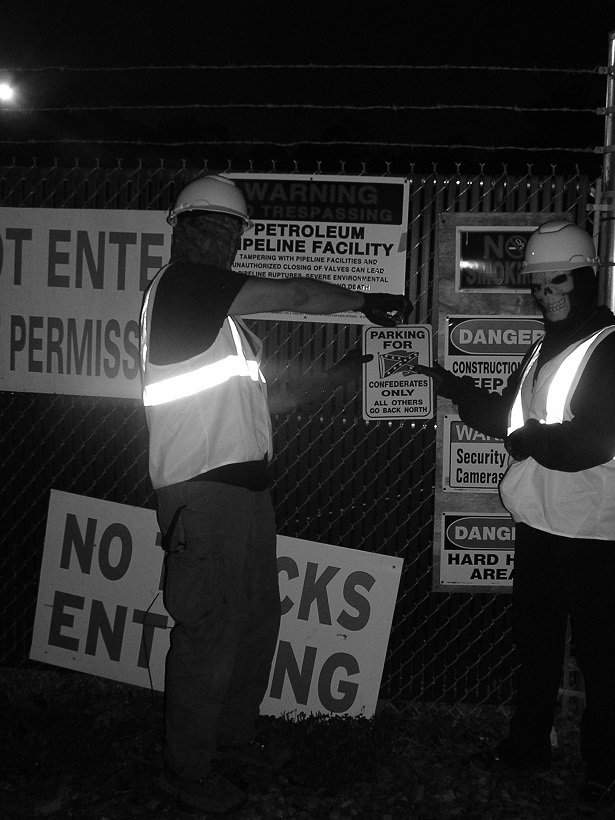
by Deep Green Resistance News Service | Sep 20, 2017 | Obstruction & Occupation
by Arkansas Rising
On the morning of September 18th, 2017, water protectors from the Rabbit Ridge Resistance conducted a safety lockout tagout on both gates of the Diamond Pipeline Pump Station in the interest of public safety. We also removed a racist Confederate Flag sign because it was the right thing to do.
The Lockout/Tagout device placed to prevent access and operation of this hazardous location.
In solidarity with sovereign rights of all indigenous people and exploited and oppressed people everywhere; in the interest of social justice and the elimination of racism, xenophobia, we have conducted, in accordance with common industrial safety procedures, an emergency lock-out/tagout operation of the Diamond Pipeline Damascus Pump Station Van Buren County, Arkansas. This action was taken by the people of the Natural State to protect the public safety.
This pipeline is unsafe. We know this from years of extensive monitoring, study, and observation supported with hard evidence–photos, federal regulation, and personal observations by experts.
Almost six months after the U.S. Corps of Engineers permit (USCOE) expired, rapid, unsafe, and shoddy construction practices continue violating OSHA, USCOE, and modern pipeline standards. Indigenous sacred areas associated with the Trail of Tears and newly identified locations are jeopardized. 14 Counties, 13 major rivers and creeks, 11 drinking water watersheds, 4 Arkansas NRC Priority Watersheds, 10 Critically Endangered Species, 2 Nuclear reactors as well as major portions of the Arkansas and Mississippi River, 5 Heritage crossing sites, and countless homes, farms and property owners are affected.
Using an eminent domain provision of the State Constitution created in the last century, as well as very special Nationwide Work Permits from the USCOE, the Diamond Pipeline has been drilled, dug, and blasted across the Natural state. Plains-All American/Valero used every loophole on the books to avoid common sense review, mediation, and mitigation while misrepresenting those that opposed the threat as terrorists.
This pipeline project ends today. Future interventions in the interest of common public safety must occur.
We demand that Governor Asa Hutchinson:
– Invoke executive authority for the protection of the people, lands, and wildlife of Arkansas
– Conduct a complete review of all the information concerning pipeline safety and construction irregularities BEFORE any more construction and BEFORE any petroleum products and derivatives enter the pipeline.
– Conduct complete review of use of law enforcement and security groups in the suppression of lawful 1st Amendment activities associated with protest and opposition to oil and gas industries.
– Invoke a complete moratorium on any OTHER use of eminent domain laws by private utility companies until effective procedures are in place to assess and provide public input to ANY use of those laws.
– Create a bonded, insurance fund to cover ANY potential damage caused by the leak, explosion, or faulty construction by any oil and gas infrastructure project.
–Rabbit Ridge Resistance










